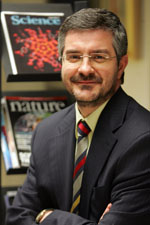Experimenting with animals to cure people
Ins and outs of medical science, in the new informative book by Enrique Sueiro, PhD in Biomedical Communication from the University of Navarra.

Can animal experimentation cure you, is this research legitimate, does science justify any internship in the use of animals, is the legal regulation adequate? Enrique Sueiro answers these questions in his new informative book Communication and Medical Science: Researching with Animals to Cure Peoplepublished by the committee Superior Center for Scientific Research (CSIC). The author details "advances that have been achieved today, although only for part of humanity, thanks to animal experiments: vaccines, transfusions, transplants, analgesics, anesthetics, etc.".
Enrique Sueiro holds a PhD in Biomedical Communication from the University of Navarra and consultant. He has been director of Communication of research center Applied Medicine (CIMA) and advisor of research center Biomedical in network (CIBER) of Respiratory Diseases, dependent on the Ministry of Science and Innovation.
In his book, he recounts cases such as that of the hormone insulin, discovered in 1921 thanks to research on the dog's pancreas. "Because it is an incurable disease, the treatments achieved have brought relief to millions of patients around the world who have gone from having to die of diabetes to being able to live with diabetes".
Respect for animals and dignity for people
He also denounces "aberrations committed against animals under the cover of the scientific research ". In particular, it crudely details cases of researchers whose "methods to induce psychopathologies in monkeys revealed an experimental cruelty unworthy of the human condition".
According to Enrique Sueiro, "scientific progress requires research with animals to cure people. Such a development requires control manager, ethical and legal. Better communication of advances financial aid to make society understand the use of animals. The public needs data and context to understand the multifaceted world of medical research . It seems reasonable to find a middle ground between reactions that prioritize the emotional and arguments that omit the affective. We can reconcile respect for animals and dignity for people".
The author contextualizes the biomedical environment, analyzes the social perception and offers guidelines for knowledge dissemination. To prepare this book, he met with experts in Spain and the United Kingdom. In the USA, he interviewed professionals from newspapers (The New York Times), universities (Harvard, Yale, Princeton, MIT, Johns Hopkins), research centers (Memorial Sloan-Kettering Cancer Center, Mount Sinai Medical Center, Columbia University Medical Center, Dana-Farber Cancer Institute, Whitehead Institute), scientific societies (Massachusetts Society for Medical Research) and various institutions, such as NASA and the National Cancer Institute.
